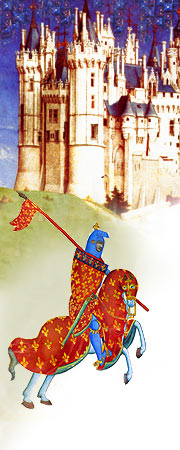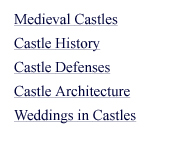Castle Defenses
Defensive
Weapons - The Castle Army
Medieval knights, men-at-arms, squires
and other soldiers usually comprised a castle garrison during
the Middle Ages. These military personnel were also known
as the mensie. Most males began a rigorous regime of medieval
warfare training at an early age. Armies were counted by lances.
Each lance was made up of one knight plus five other men.
1,500 lances equaled 9,000 men. In addition to these numbers
were the many archers and other foot soldiers. While wealthy
knights could afford armor or chain mail, the average foot
soldier was lucky to possess a wooden shield for protection.
Animals were also used for military duties.
Watchdogs, turkeys, and geese stood as sentries more often
than humans. Pigeons could be used to send messages over long
distances. Dogs were bred and trained to be vicious in battles.
Medieval Hand-Held Weapons
Medieval weaponry ran the gamut from
the simple to the complex. Perhaps the simplest Middle Age
weapons were rocks thrown from castle walls. These missiles
were limited in distance, and primarily used against soldiers
trying to scale fortress walls.
Archery served as popular medieval recreation,
but most longbows were more effective on open battlefields.
But they also had relatively shorter range and used lighter
arrows than were needed to defend a castle. As such, the crossbow
became very popular for both the attacking and defending armies.
These weapons were not new, having been around since the early
Middle Ages, but they were not used effectively until the
12th century. A Catholic Church decree had them banned for
a short time because they were so deadly and effective. Crossbows
were drawn by either a stirrup-cocking devise for those on
horseback, or with a hand-crank winding mechanism for foot
soldiers. Medieval fighters proficient with the crossbow often
became prized members of a castle's garrison. Arrows, or bolts
called quarrels, would be shot to distances up to 400 yards.
Crossbows became very suited for castle defense and were often
shot from small, slit-shaped windows in castle walls called
muertieres. Arrows varied…flaming ones could be shot
at wooden towers and medieval siege engines to set them on
fire.
Ferocious hand-to-hand fighting would ensue
once attacking soldiers had breached the walls. Broadswords,
spears, and double-bladed battleaxes were all
used in medieval combat. Men who possessed swords held great
status among the soldier caste. Many hand-held weapons were
relatively simple to build and were used throughout the Dark
Ages.
|










